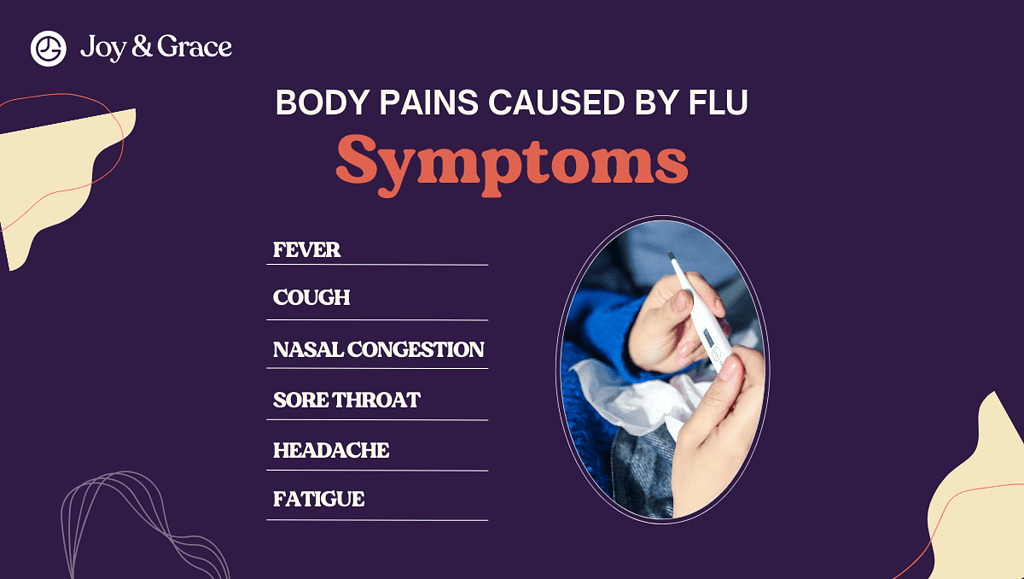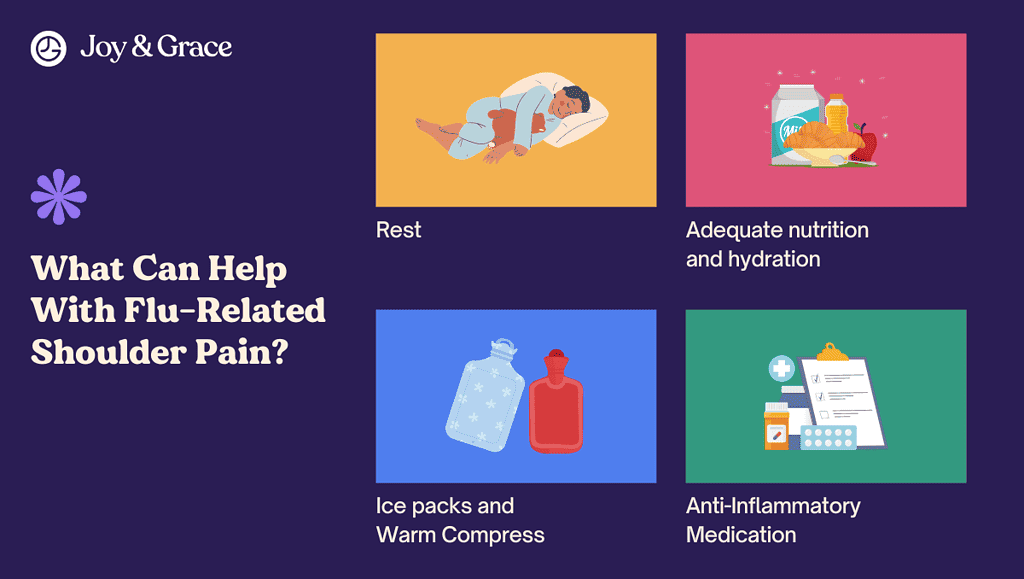We all dread the arrival of flu season and what it brings. Picture yourself red-nosed, stuck in bed, and dealing with a cough and fever. It is definitely something we want to avoid, as the flu can be a pain, literally.
If you did catch the pesky bug, you probably have pain in some areas of your body, including your shoulders. But why is that? This article explains the connection between shoulder blade pain and the flu and what you can do to relieve it.
Can A Flu Cause Neck and Shoulder Pain?
Yes, it can. Body pain is a common complaint among people with the flu. It concentrates on the neck, shoulder, and back. So how does the flu cause neck and shoulder pain? Let's first learn about the flu and how it affects our bodies.
The flu, or influenza, is a respiratory infection caused by the influenza viruses.
These viruses infect an estimated 5-20% of Americans each year. You catch the flu when you come into contact with infected droplets from an infected person.

Once the virus enters our body, it starts to invade the cells that line our airways. This triggers an immune response, causing body pain and other common symptoms, such as:
- Fever
- Cough
- Nasal Congestion
- Sore Throat
- Headache
- Fatigue
Why Does The Flu Cause Shoulder Blade Pain?
As mentioned earlier, the flu symptoms result from our immune response to the flu. This immune response causes the release of cytokines and interleukins that promote inflammation. However, other healthy tissues can be caught in the crossfire, including the muscles and joints of our shoulders.
These muscles and joints may become inflamed and present as shoulder blade pain. The pain may feel like a deep, dull ache localized in our shoulders or a sharp, stabbing pain that can run down our forearm. In rare cases, the flu can cause acute myositis, which can cause extreme pain, muscle degeneration, and weakness.
Another reason why the flu can cause shoulder pain is pleurisy. Pleurisy is the inflammation of the two thin layers of tissue that line our lungs. It is a severe condition and a sign that the virus has spread deeper into our pleural cavity.
Pleurisy causes a sharp chest pain when breathing or coughing. This pain often travels to the shoulder, also causing shoulder blade pain.
Can Flu Vaccinations Cause Shoulder Blade Pain?
The best way to avoid the flu is by getting your yearly flu shot. But, flu vaccinations can have side effects, including mild shoulder pain.
These side effects are no cause for worry, as this is a good sign that your body can build immunity against the virus. Flu vaccines contain inactivated influenza viruses to stimulate the production of antibodies.
You can also be allergic to the other vaccine components. If you are unfortunately allergic to eggs and chicken, you have a higher chance of developing an allergic reaction to flu vaccines.
The CDC has a very comprehensive discussion about the flu vaccine too. Flu vaccines have an excellent safety profile, and adverse effects are short-lasting. However, it would be best if you talked with your doctor about any concerns about getting vaccinated against the flu.
Shoulder blade pain and other side effects from a flu shot usually last only 1-3 days. If your shoulder pain is severe and persists for more than a week, you may have a Shoulder Injury Related to Vaccine Administration (SIRVA).
What Is SIRVA?
SIRVA refers to any form of a shoulder injury after vaccination. It is an infrequent adverse effect of vaccination and occurs only in a fraction of vaccinations. Although rare, it is still best to be on the lookout.
Improper vaccine administration is the leading cause of vaccine-related shoulder injuries. In reported cases, it results from injecting the vaccine too high or too deep into the shoulder. This can damage the covering of the shoulder joint, the nearby nerves, muscles, and even the bone.
SIRVA can cause various shoulder dysfunctions, such as bursitis or frozen shoulder. You may feel severe shoulder pain accompanied by stiffness and muscle weakness. In rare but severe cases, it may even cause paralysis. The symptoms can appear 24–48 hours after vaccination and last months or years if left untreated.
What Can Help With Flu-Related Shoulder Pain?

Flu-related shoulder pain disappears as soon as the infection resolves. In cases where you are at high risk of complications, your doctor may prescribe antiviral medications.
You can also do things at home to help ease your symptoms. This include:
- Rest. Having adequate sleep at night is essential to ensuring your immune system can fight infection. It also helps to avoid over-exerting and give your body time to heal. So we may have to lay off our exercise and workouts for a while.
- Adequate nutrition and hydration. We know food can taste terrible when we have the flu, but proper nutrition helps our body fight infection. Water, fruit juice, and warm soup can also relieve congestion and help clear out the virus faster.
- Ice packs and Warm Compress. Ice packs help to reduce the inflammation and swelling that can come with your shoulder blade pain. Meanwhile, a warm compress helps heal and soothe aching muscles when the swelling has died down. We have a scented heating pad to help relieve any neck and shoulder pain from the flu.
- Anti-Inflammatory Medication. You can try taking over-the-counter painkillers, such as Tylenol or Ibuprofen, to help relieve the pain. If those don’t work, you can ask your doctor to prescribe stronger painkillers to deal with the pain.
When To Seek A Doctor For Flu And Shoulder Blade Pain?
Although the flu can be a mild infection, it can still lead to some severe complications. The sniffles and cough can become full-blown pneumonia in people with conditions such as hypertension or asthma. And sometimes your flu may not be the flu at all.
"My initial response was that I had the flu. I felt an immediate and extreme (almost like someone shutting a door on you) sense of flu symptoms."
– Julia Allen, 48, to Women's Health Magazine on her heart attack
So if you are experiencing any of the following symptoms, it is best to seek medical care right away:
- Severe, crushing chest pain
- Shortness of Breath
- Sudden nausea
- Difficulty breathing
- Blue discoloration of nails or lips
- Severe and debilitating shoulder pain
- Paralysis of shoulders and arms
Takeaway
The flu can indeed cause shoulder pain, but there is no need to worry. Although it can be a literal pain, it is a sign that our body is doing its job of fighting the infection.
The best way to avoid getting the flu and any flu-related shoulder pain is to get vaccinated. Flu vaccines are safe, and any side effects are short-lasting.
The flu is an infection our bodies are perfectly capable of fighting off. There are also easy remedies you can do to help speed up recovery.
While it may be a mild infection, the flu can cause severe complications for those at risk. Flu-like symptoms can also signify other serious conditions, such as a heart attack, so visiting a doctor for the flu is no cause for shame!
If you found this article helpful, feel free to share it with family and friends. And remember to check out our heating pad, which can help relieve pain. The herbal scents are sure to help you relax too!















